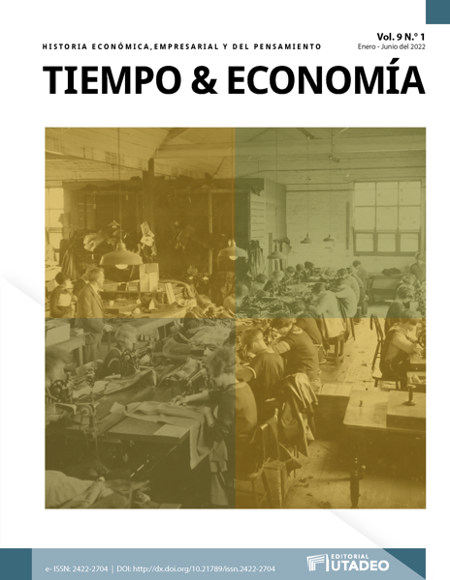
Esta obra está bajo una licencia internacional Creative Commons Atribución-NoComercial-CompartirIgual 4.0.
Esta obra está bajo una licencia internacional Creative Commons Atribución-NoComercial-CompartirIgual 4.0.
Resumen
This paper discusses how Prussia’s public education policy was intentionally guided by economic principles that modern economists have formalized and modeled. The essay compares the results of two economic models with the intentions held by Prussian government officials, which are enshrined in the research agenda of historians and academics. The paper concludes that Prussia’s public education policy was intuitively and intentionally influenced by economic principles and intuitions of the theoretical and empirical models chosen.
Citas
Carsten, F. (1990). Der preußische Adel und seine Stellung in Staat und Gesellschaft bis 1945. Geschichte Und Gesellschaft. Sonderheft, 13, 112-125. http://www.jstor.org/stable/40194825
Damm, P. F. (2019). Die Technischen Hochschulen in Preussen: Eine Darstellung Ihrer Geschichte Und Organisation; Nach Amtlichen Quellen. Forgotten Books. https://books.google.com.co/books?id=-tRStAEACAAJ
Drukker, D. M., Prucha, I. R., & Raciborski, R. (2013). Maximum likelihood and generalized spatial two-stage least-squares estimators for a spatial-autoregressive model with spatial-autoregressive disturbances. The Stata Journal, 13(2), 221-241. https://doi.org/10.1177/1536867X1301300201
Galor, O., & Moav, O. (2006). Das Human-Kapital: A theory of the demise of the class structure. The Review of Economic Studies, 73(1), 85-117. https://doi.org/10.1111/j.1467-937X.2006.00370.x
Hollenbach, F. M. (2019). Elite interests and public spending: Evidence from Prussian cities. The Review of International Organizations, 16, 189-211. https://doi.org/10.1007/s11558-019-09347-z
Melton, J. V. H. (1988). Absolutism and the eighteenth-century origins of compulsory schooling in Prussia and Austria / James Van Horn Melton. Cambridge University Press.
Neugebauer, W. (2010a). Acta Borussica: Neue Folge, 2. Reihe: Preußen als Kulturstaat, Abteilung I: Das Preußische Kultusministerium als Staatsbehörde und gesellschaftliche Agentur (1817-1934), Band 2.1: Das Kultusministerium auf seinen Wirkungsfeldern Schule, Wissenschaft, Kirchen, Künste und Medizinalwesen:
Darstellung. Akademie-Verlag. https://nbn-resolving.org/urn:nbn:de:kobv:b4-opus-25315
Neugebauer, W. (2010b). Acta Borussica: Neue Folge, 2. Reihe: Preußen als Kulturstaat, Abteilung I: Das Preußische Kultusministerium als Staatsbehörde und gesellschaftliche Agentur (1817-1934), Band 2.2: Das Kultusministerium auf seinen Wirkungsfeldern Schule, Wissenschaft, Kirchen, Künste und Medizinalwesen: Dokumente. Akademie-Verlag. https://nbn-resolving.org/urn:nbn:de:kobv:b4-opus-25323
Peirce, W. S., & Kruger, P. (1993). Entrepreneurship in a bureaucracy: The case of Friedrich Althoff. Journal of Economic Studies, 20(4/5). https://doi.org/10.1108/EUM0000000000171
Senn, P. R. (1993). Where is Althoff? Looking for Friedrich Althoff in English language sources. Journal of Economic Studies, 20(4/5). https://doi.org/10.1108/EUM0000000000179
Vereeck, L. (1993). The economics of science and scholarship: An analysis of the Althoff System. Maastricht University Datawyse/Universitaire Pers Maastricht.
Yu, J. (2011). Die Entwicklung berufsbildender Schulen in Preußen, Sachsen und Württemberg zwischen 1869 und 1914 (Doctoral dissertation, Leibniz Universität Hannover). Leibniz Universität Hannover Repository. https://www.repo.uni-hannover.de/handle/123456789/7845

 PDF (English)
PDF (English)
 FLIP
FLIP












